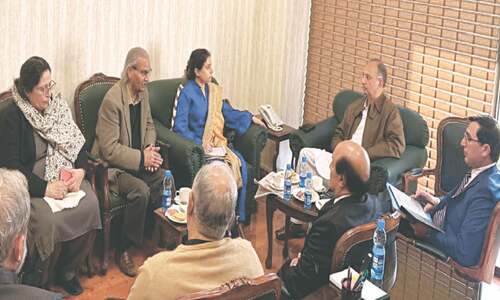LAHORE, Jan 12: There is no chance of improvement in car sales in the immediate future as the economy is already in recession and the future outlook remains gloomy.
This was stated by Ayaz Hafeez, a senior executive of the Honda Atlas Cars Pakistan on Monday as he led a group of journalists through the company’s assembly line.
The briefing was organised for the media to introduce the new third generation model of 1.3L Honda City before its formal launching expected towards the end of this month.
As the economy plunges the car sales have dropped by 46 per cent to 33,858 units during the first five months of this fiscal to November from 62,815 units a year earlier. The smaller cars have been hit the hardest as domestic prices shoot up on account of over 28 per cent depreciation in the rupee value, rising cost of car leasing and broad-based economic downturn. The drop in sales has resulted in massive job losses in the domestic car industry in recent months.
The large scale manufacturing (LSM) also posted a negative growth of 6.5 per cent in the first quarter of the current financial year to September. The government has cut its gross domestic product (GDP) projections to below 3.5 per cent from 5.5 per cent for the current year as it implements macroeconomic stabilisation programme under the oversight of the International Monetary Fund (IMF).
Most manufacturers insist that the IMF balance-of-payments support of $7.6 billion – first tranche of $3.2 billion was released in November boosting Pakistan’s falling foreign-currency stocks to a little above $10 billion from $6.3 billion – was crucial to bring back a semblance of economic stability.
“But the conditions attached to the IMF loan – increase in the credit price, expenditure cut, etc, will severely harm the economy in general,” a textile said. “Which business can survive 20 to 22 per cent interest rate?,” he asked.
The central bank enhanced its policy rate by 5.5 per cent from July 2007 to Nov 2008 in a bid to control the spiking inflation, which is hovering around 24 per cent.
A leather garment exporter said the industry was facing severe energy shortages leading to 50 per cent cut in production and layoffs.
Turning to the car sales, Ayaz did sound optimistic about early economic recovery that could boost sales, but he was confident of his company retaining its market share. “Our sales have dropped by 20 to 23 per cent, lowest in the industry, and these may go down a bit further in 2009. But our new City model will remain the market leader in this (1.3L) segment of cars,” he said.
To a questioner, who wondered as to why a new model was being introduced in the market when the industry’s sales were slumping, he retorted: “True, the economy is in recession but does that mean we should shut the shop? No.”
But the number of manufacturers and producers, who share Ayaz’s faith in the future of the economy, is declining by the day. Persistent energy shortages and rising cost of production are not helping to improve the economic outlook.










































Dear visitor, the comments section is undergoing an overhaul and will return soon.